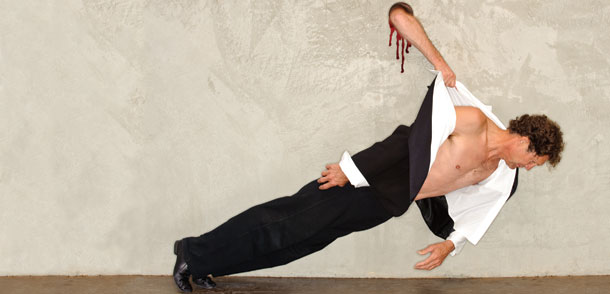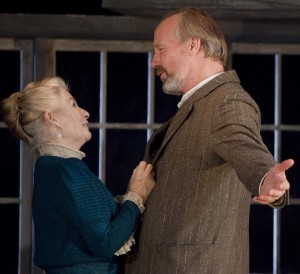
By Bob Hicks
Actors have a parlor trick they like to pull out to amaze and amuse their non-thespian friends. I’m not sure if it has an accepted given name, but I sometimes call it the “laugh-cry game.” It’s simple, really: They cover their faces, start making an odd guttural sound, and challenge you to tell whether they’re laughing or crying. In terms of technique, both actions come out of the same place.
It’s fitting that the art of acting is so often depicted with drawings of the tragic and comic masks, because the comic and tragic are so often barely a whisker’s width separated from each other. Tragedy gets the respect. Comedy gets the love, if often reluctantly. But really, the balance is a lot closer. Remember, Chekhov insisted his mournful plays were comedies.
 I think of this because the big deal in Puddletown this weekend is Saturday night’s opening of Long Day’s Journey Into Night, Eugene O’Neill‘s imperial American classic, at Artists Repertory Theatre. This production has Serious written all over it. A co-production with Australia’s Sydney Theatre Company, it stars occasional Oregonian William Hurt as the destructive Tyrone family patriarch, and it drew sparkling reviews in its recently closed Sydney run. I look forward to it not just because it arrives with stellar recommendations but also because O’Neill was in a very real sense the father of American theater, our first true genius. That he was such a morose son of a bitch was the luck of the draw. France got Moliere, the satiric comedian. England got Shakespeare, the astonishing Everyman. We got Old Bleak House, and few writers have ever done bleak better: O’Neill paints loss in despairingly seductive strokes of love.
I think of this because the big deal in Puddletown this weekend is Saturday night’s opening of Long Day’s Journey Into Night, Eugene O’Neill‘s imperial American classic, at Artists Repertory Theatre. This production has Serious written all over it. A co-production with Australia’s Sydney Theatre Company, it stars occasional Oregonian William Hurt as the destructive Tyrone family patriarch, and it drew sparkling reviews in its recently closed Sydney run. I look forward to it not just because it arrives with stellar recommendations but also because O’Neill was in a very real sense the father of American theater, our first true genius. That he was such a morose son of a bitch was the luck of the draw. France got Moliere, the satiric comedian. England got Shakespeare, the astonishing Everyman. We got Old Bleak House, and few writers have ever done bleak better: O’Neill paints loss in despairingly seductive strokes of love.
Good laughs are nothing to sniff at.
Continue reading You’ll laugh, you’ll cry, you’ll darn near die
 Boffo. There it is. He loves that word. It makes him feel so, so … Variety-ish. As in, “Sticks Nix Hick Pix” (improved to the more rat-a-tat “Stix Nix Hix Pix” in the 1942 movie musical
Boffo. There it is. He loves that word. It makes him feel so, so … Variety-ish. As in, “Sticks Nix Hick Pix” (improved to the more rat-a-tat “Stix Nix Hix Pix” in the 1942 movie musical